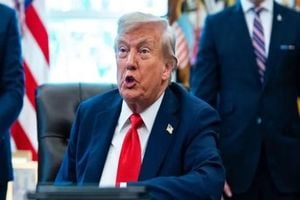Elon Musk, the billionaire entrepreneur and founder of Tesla and SpaceX, has found himself embroiled in legal battles over artificial intelligence, particularly involving OpenAI, the organization he co-founded. Initially seen as a champion for responsible AI development, Musk now claims the company strayed from its noble mission to aid humanity, claiming OpenAI has become more focused on profit than purpose.
Recently, he expanded his legal assault against OpenAI, accusing it of colluding with its major backer, Microsoft, to circumvent antitrust laws. Musk's allegations assert the two have been working together to turn OpenAI, which is known for its AI tools like ChatGPT, from its original nonprofit intentions to becoming a profit-driven enterprise benefiting Microsoft. This shift, according to Musk, undermines the very foundation of AI ethics and safety, which he has long advocated for.
The amended lawsuit filed against OpenAI includes Microsoft and Reid Hoffman, a board member of Microsoft and former member of OpenAI’s board, as co-defendants. This expansion demonstrates Musk's determination to tackle what he sees as the unethical commercialization of AI technology.
Meanwhile, the backdrop for these developments involves the transformative political atmosphere under Donald Trump, who has garnered substantial support from Musk. Trump’s potential return to the White House has raised eyebrows among technology watchdogs, as experts warn the administration may usher in an era of lax regulations for the tech industry, especially AI. This transition could lead to risks posed by rapid technological advancements without stringent oversight.
Analysts suggest Trump's strategy may favor economic growth at the expense of regulatory frameworks, allowing AI technologies—like self-driving cars—to advance more quickly than safety measures can keep up. Under such conditions, the likelihood of accidents or mishaps involving autonomous technology may increase, raising additional concerns about accountability.
For Musk, close ties with Trump could present opportunities for his businesses to thrive under more favorable regulatory conditions. Some experts posit these alliances may allow Musk to influence governmental decisions relating to technology regulations, potentially avoiding previous hurdles Tesla faced.
At the same time, Trump's newfound interest in cryptocurrency has prompted some to speculate how this could interplay with AI developments. While the ex-president was once skeptical of Bitcoin, he has since pivoted to embrace the sector, making promises during his election campaign to champion cryptocurrency and even courting the crypto community.
Adding fuel to the fire, recent remarks by Musk indicated he sees the need for responsible AI practices. He warned of dangers like misinformation generated by AI—fake news spread through social media lacks guidelines to prevent misuse. Musk's concerns resonate with the potential societal impact these technologies can have when left unchecked.
Although the tech community eagerly anticipates innovations and advancements stemming from such upheavals, the central question remains: Can society capitalize on the benefits of AI without falling prey to its potential pitfalls? With influential figures like Musk and Trump at play, the answer may depend on how public sentiment and legal structures evolve.
Looking forward, Musk's actions reflect the growing tensions between technological innovation and ethical responsibility. Observers are urged to keep eyes peeled as this saga continues to develop, especially as more legal challenges and political maneuvers emerge.
Across the industry, experts, tech enthusiasts, and concerned citizens remain vigilant. The stakes have never been higher—will society safely navigate this new tech frontier, or are we barreling toward uncharted risks?



